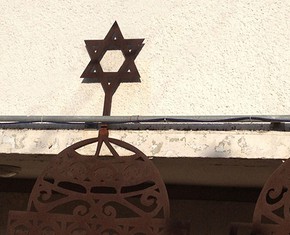The views expressed in our content reflect individual perspectives and do not represent the authoritative views of the Baha'i Faith.
Fighting about our values and what name we call ourselves, as believers, leads to one of the worst human errors: that our religion is the best, the truest, or the only way to know and love God.
So how can we begin to remedy this fundamental human mistake, which inevitably leads to misconceptions, religious conflicts and false comparisons? The Baha’i teachings ask us to consciously rid our minds and hearts of our religious prejudices, and treat all people with love and kindness—so let’s clear up some common misconceptions about the Baha’i Faith:
- that Baha’u’llah claimed to be the “supreme” messenger of God for this age,
- that Baha’u’llah’s teachings “override” those of past prophets and messengers, including Muhammad, Christ, Moses, Buddha and so on,
- that Baha’is believe the teachings of these past prophets are “outdated” and therefore should not be followed any longer.
These untrue misinterpretations cause friction and confusion in the minds of people trying to understand Baha’u’llah’s message—and the message of past prophets. First, let’s be clear: the Baha’i writings clearly say the core spiritual teachings of all the divine teachers are the same, as is their source:
The Reality of the divine Religions is one, because the Reality is one and cannot be two. All the prophets are united in their message, and unshaken. They are like the sun; in different seasons they ascend from different rising points on the horizon. Therefore every ancient prophet gave the glad tidings of the future, and every future has accepted the past. – Abdu’l-Baha, Abdu’l-Baha in London, p. 29.
Beyond comparison and distinction, Baha’is believe that the basic mission of all religion always remains the same: to regenerate the hearts and souls of every human being on the planet. The founders and prophets of those religions have appeared at different times in history and in humanity’s development, to provide needed guidance, both spiritual and social. The means and words they chose may have differed—yet they all called the people to God, not to themselves. They were the first to swear fealty to the Creator, and to foreswear any allegiance to themselves over God.
All the messengers of God impart spiritual truths through their lives and teachings. They all have stated that the one God is the source of their being and inspiration. They reflect the beauty of the Creator, acting as perfect mirrors, reflecting and broadcasting the divine light for all humanity. This is their one reality, their equal station.
We have only to read the Writings of all the divine teachers to see their perfect agreement. For example, Christ said: “Thou shalt love the Lord thy God with all thy heart, and with all thy soul, and with all thy mind.” – Matthew 22:37. In a similar vein, Muhammad said, “No God but Allah.” – Qur’an 6:106. Baha’u’llah echoed these words when he wrote:
That which beseemeth you is the love of God, and the love of Him Who is the Manifestation of His Essence, and the observance of whatsoever He chooseth to prescribe unto you, did ye but know it … – Gleanings from the Writings of Baha’u’llah, pp. 304-305.
In other words, the love of God lies at the core of human life and purpose—and at the core of every Faith.
Another example of this continuity and unity, the Golden Rule, shows that all divine messengers teach us to treat others with equal love and respect. In the Bible, Christ reminds us to “Love your neighbor as thyself.” – Matthew 22:39. In the Qur’an, Muhammad warns us to “Pay, Oh Children of Adam, as you would love to be paid, and be just as you would love to have justice!” – 83:1-6. Likewise, Baha’u’llah cautioned “Beware lest ye prefer yourselves above your neighbors.” – Gleanings from the Writings of Baha’u’llah, p. 315.
At necessary times in human history, these messengers of God acted as the unerring balance, the way and the truth, the source of light and wisdom that all could turn to. Each messenger also changed, let stand or abrogated the social laws of previous religions. This is natural and necessary, because humanity and our social conditions do change over time, as does our capacity to respond to God’s message. Yet in every case, the existing religious authorities fought against these changes and vilified, tortured, or put to death the new messengers, causing untold sorrow, confusion, and strife to this day.
Despite attempts to stifle their progress, the great Faiths have endured. The proof of a messenger’s divinity lies in their fruits, in the loving compassion and new systems of justice and governance enacted by their followers. They and their followers may be condemned to death, but what humanity doesn’t fully realize is that God has a plan—a progressive series of messengers, each one bringing a new teaching to revitalize and reawaken humankind. Their teachings affirm and enhance the previous teacher’s precepts. That they appear to conflict with each other reveals our limited understanding and misinterpretation of their missions.
So what is the station of Baha’u’llah, who Baha’is revere as the latest in a long line of prophets and messengers? According to the Universal House of Justice, the supreme Baha’i administrative body, Baha’u’llah is “the Promised One of all ages,” “the Dawning Point of the Day of God, the ‘Day in which God’s most excellent favors have been poured out upon men.” – The Universal House of Justice, Letter to the Baha’is of the World, April, 1992.
The Baha’i teachings claim that Baha’u’llah’s station culminates and fulfills all the past religious revelations. But Baha’u’llah has also inaugurated a new cycle of revelation, which does not end with his appearance. The Baha’i teachings say this process of progressive revelation will continue as long as the human race continues—and that humanity will continue to benefit from God’s message:
Baha’u’llah has drawn the circle of unity, He has made a design for the uniting of all the peoples, and for the gathering of them all under the shelter of the tent of universal unity. This is the work of the Divine Bounty, and we must all strive with heart and soul until we have the reality of unity in our midst, and as we work, so will strength be given unto us. – Abdu’l-Baha, Paris Talks, p. 55.
Like his divine predecessors, Baha’u’llah calls humanity to our highest expression of nobility and unity with our fellow creatures. His distinct station and teachings inaugurate a new era of global peace and justice. “To build anew the whole world” is the claim and challenge of Baha’u’llah’s mission.
You May Also Like
Comments

















(Abdu'l-Baha, Tablets of the Divine Plan, p. 32)